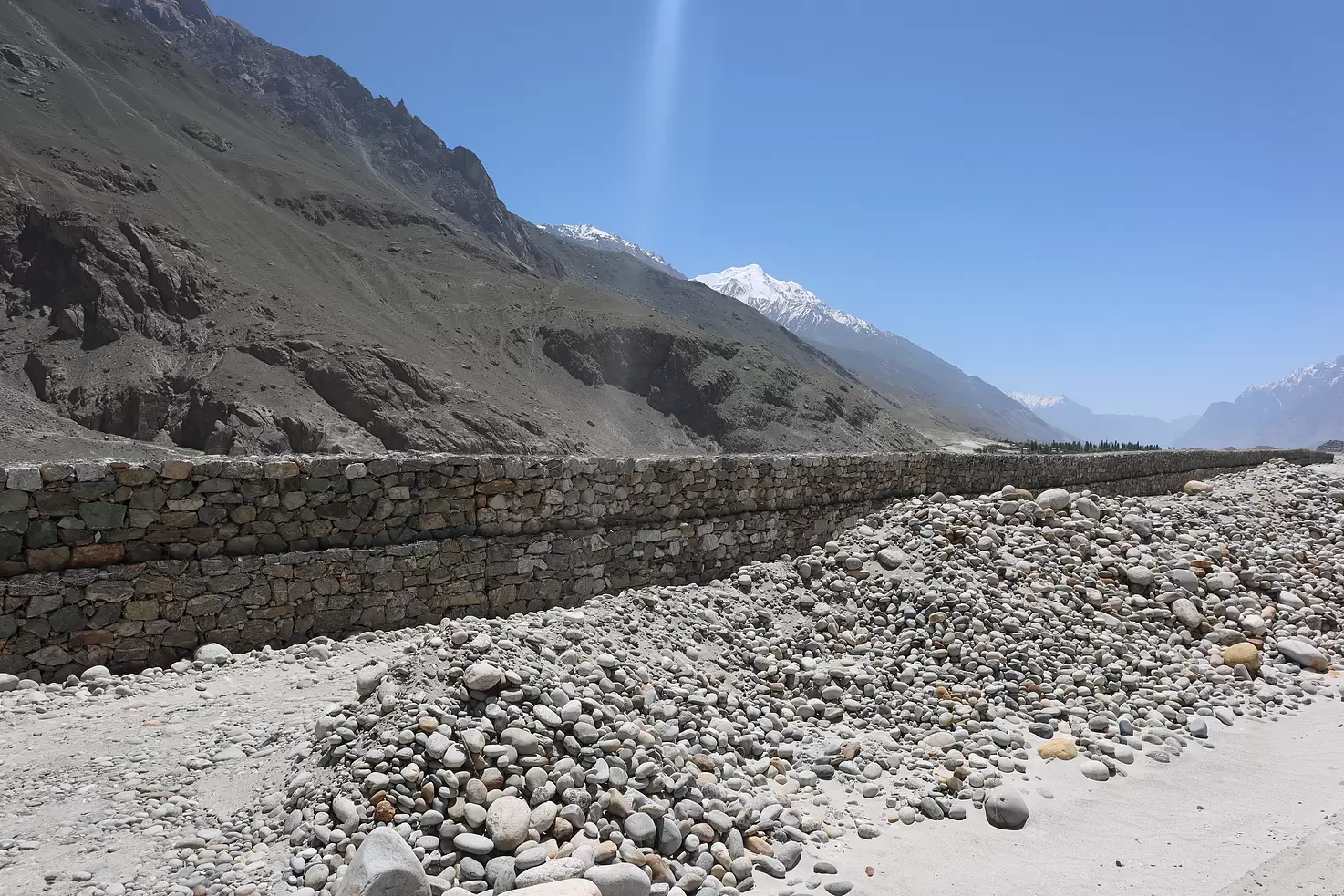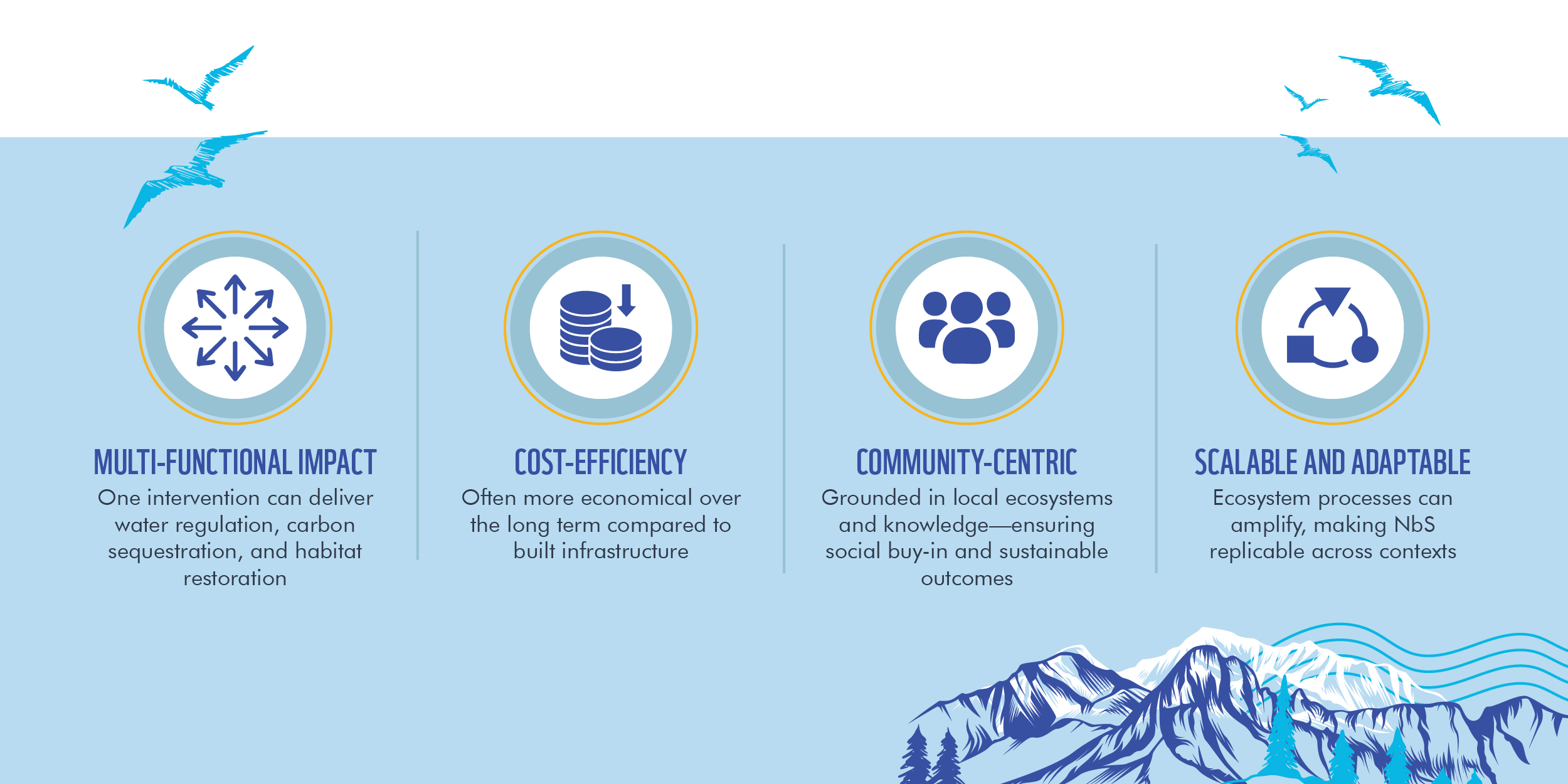The WWF is run at a local level by the following offices...
- WWF Global
- Adria
- Argentina
- Armenia
- AsiaPacific
- Australia
- Austria
- Azerbaijan
- Belgium
- Bhutan
- Bolivia
- Borneo
- Brazil
- Bulgaria
- Cambodia
- Cameroon
- Canada
- Caucasus
- Central African Republic
- Central America
- Central Asia
- Chile
- China
- Colombia
- Croatia
- Democratic Republic of the Congo
- Denmark
- Ecuador
- European Policy Office
- Finland
When rivers overflow, forests thin, and livelihoods come under threat, nature itself holds the answers. WWF-Pakistan is pioneering Nature-based Solutions (NbS) - approaches that draw on the strength of healthy ecosystems to tackle climate, water, biodiversity, and livelihood challenges. By restoring wetlands, revitalizing watersheds, reforesting degraded landscapes, and working alongside communities, NbS provide sustainable, cost-effective alternatives to conventional infrastructure while building lasting resilience against climate change.

What Are Nature-based Solutions
Nature-based Solutions (NbS) are deliberate actions that work with and enhance ecosystems to address societal challenges and gain biodiversity benefits. They include restoring/constructing wetlands, reforesting degraded land, protecting mangroves and natural forests, constructing bioswales, restoring natural drainage pathways, improving rangeland management, and creating green infrastructure in cities. At their core, NbS harness the power of functioning ecosystems to deliver services like cleaner water, cleaner air, climate change mitigation and adaptation, disaster risk reduction and biodiversity protection that people might otherwise seek from engineered infrastructure. The multiple and interconnected benefits of NbS are increasingly being recognized globally for reducing disaster risks, supporting food and water security, improving human well-being, and restoring biodiversity.
For millennia, indigenous peoples and local communities have relied on nature’s processes to manage land, water, and resources sustainably. Building on this legacy, modern NbS must remain people-centered - designed and led with communities, grounded in traditional and local knowledge. Successful NbS are deliberate, inclusive and transparent, developed with respect for land rights and local voices, and ensure that the social, economic, and environmental benefits are shared equitably.
Pakistan has historically relied on grey infrastructure, such as concrete dams, embankments, canals, and drainage systems, to manage water and mitigate disasters. While these structures provide short-term relief, they often fail to address the root causes of vulnerability. In many cases, these solutions are expensive to build, difficult to maintain, and limited in scope - designed to solve a single problem rather than delivering broad, long-lasting resilience.
NbS offer a transformative alternative by leveraging natural processes to achieve multiple benefits at once. Unlike grey infrastructure, NbS work with the environment, not against it, creating systems that regenerate, adapt, and strengthen over time – providing a host of co-benefits and enabling long-term resilience while being cost-effective, people-centered, and environmentally sustainable.

Pakistan is on the frontlines of the global climate crisis, where increasingly frequent and destructive catastrophes have exposed the limits of relying solely on grey infrastructure. These engineered systems, costly to maintain and narrow in scope, often fail under the scale and complexity of today’s climate challenges.
NbS offer a more resilient pathway by directly addressing both ecological degradation and community vulnerability. By restoring wetlands, regenerating forests, restoring river basins, and restoring and constructing riparian wetlands and managing watersheds, NbS regulate water flows, recharge aquifers, stabilize soils, and create natural buffers against disasters
WWF-Pakistan is pioneering Nature-based Solution to secure livelihoods and strengthen climate resilience. Recharge Pakistan is restoring wetlands and floodplains to reduce flood risks and recharge aquifers. In Dera Ismail Khan, 14,215 hectares of degraded landscapes are being revitalized through native plantations that stabilize soils and regulate runoff. At Manchar Lake in Sindh, 30 kilometers of flow paths are being excavated to restore the natural hydrology of a 25,000-hectare wetland, ensuring that floodwaters spread safely while biodiversity thrives. Smaller interventions, such as de-silting ponds and reinforcing embankments in Badri Village, are enhancing local water storage and erosion control.
Similarly, under the Water Resource Accountability in Pakistan (WRAP) project, WWF has introduced a wide range of green infrastructure across the Indus Basin. From restoration of degraded forest and pasture/rangelands complemented by natural drainage pathway restoration and flood diversion walls to erosion control structures and water retention ponds in Gilgit-Baltistan and KP, interventions reduce flood and drought risks while restoring the ecological health of watersheds. Communities are at the center of these projects, engaged in planning, implementation, and long-term stewardship, ensuring that nature-based solutions are inclusive and sustainable.
These projects are only the beginning. By investing in nature as infrastructure, Pakistan can build a future where rivers are buffered by wetlands, villages are sheltered by forests, and livelihoods are strengthened rather than undermined by the climate crisis.

WWF-Pakistan is following the IUCN Global Standards for Nature-based Solutions to implement interventions under its Water Resource Accountability in Pakistan (WRAP) project. These standards comprise 8 criteria and 28 indicators and are essential to ensure social, economic, and ecological accountability and transparency, inclusive governance, adaptive management, and risk-informed design. Guided by IUCN, WWF-Pakistan has also adopted specific tools to align its interventions with these global standards for Nature-based Solutions (see tools and approaches here).